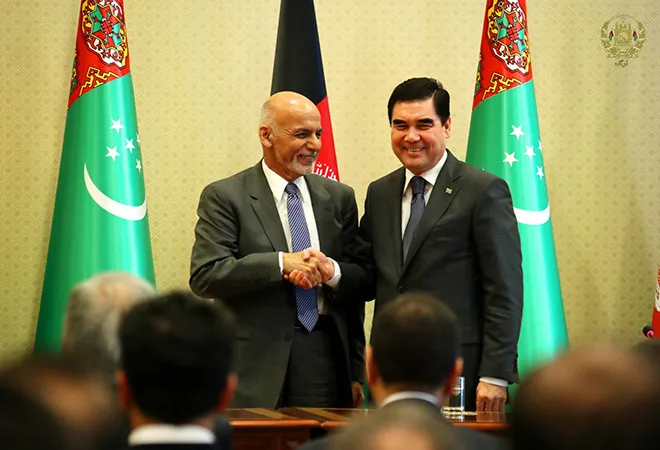
Since the fall of the Taliban in 2001, relations between Afghanistan and Turkmenistan have grown consistently. The past two years, especially, under the National Unity Government of Afghanistan have seen rapid expansion of bilateral ties between the two countries. Afghan President Mohammad Ashraf Ghani and his Turkmen counterpart President Gurbanguly Berdimuhamedov share a vision of win-win economic cooperation, demonstrating through initiation and implementation of numerous bilateral and multilateral economic and connectivity projects. These projects foremost bolster the two countries’ own economic growth, while ensuring prosperity and security throughout the region.
In essence, Afghanistan and Turkmenistan fight against terrorism and radicalism by reducing extreme poverty, which enables regional and global terrorist networks to prey on destitute, prospectless youth for radicalisation and recruitment to destabilise South Asia and Central Asia. It is also rife poverty and a lack of job opportunities that enable a permissive environment for drug-production and drug-trafficking, which feeds regional and transnational criminality. Revenues from a criminalised economy in turn finance terrorism, undermining regional stability and thus impeding economic growth across South Asia and Central Asia.
Following a number of high level state visits exchanged between the two countries, Ghani visited Ashgabat on 3 July 2017 and signed seven bilateral cooperation agreements and MOUs with his counterpart. The two leaders built on their hitherto progress in pushing forward bilateral and multilateral infrastructure, energy, and transportation projects that would further connect South Asia and Central Asia through Afghanistan and Turkmenistan.
Progress in the implementation of these much-needed projects would enable Afghanistan, Turkmenistan and others to harness their massive energy and connectivity potential for meeting their sustainable development goals (SDGs) at the heart of a rising Asia.
More specifically, in line with Afghanistan’s economic-centric foreign policy with a focus on promoting regional economic integration through full-spectrum connectivity, Ghani emphasised in Turkmenistan the importance of implementing multilateral energy and transportation projects. He and his counterpart welcomed continuing progress on the building of the Turkmenistan-Afghanistan-Pakistan-India (TAPI) natural gas pipeline, whose full realisation would help create economic inter-dependency against zer0-sum designs that stall regional economic growth.
Moreover, the Turkmenistan-Afghanistan-Pakistan (TAP) and Turkmenistan-Uzbekistan-Tajikistan-Afghanistan-Pakistan (TUTAP) electricity projects were also discussed. Their realisation would increase urban and rural access to electricity, most benefiting households and small and medium-sized businesses across the region. Electrification of rural Afghanistan and Pakistan would particularly help the two countries improve their dismal social development indicators in the areas of education and healthcare where qualitative and quantitative improvements would generate a healthy, productive workforce needed to drive the two countries’ sustainable development.
The two sides also discussed the Afghanistan-Turkmenistan-Azerbaijan-Georgia-Turkey (Lapis Lazuli) trade and transit corridor, as well as the Tajikistan-Afghanistan-Turkmenistan (TAT) railway, whose implementation would open alternative trade routes for the whole region.
Two-way flow is not just trade and investment, but also expansion of people-to-people contact among South Asia, Central Asia, and Europe would help Afghans regain their country’s former status as the roundabout of the Silk Road.
That is why Afghanistan is an active member of every regional organisation with a core objective of enhancing infrastructure and transportation connectivity. This year, Afghanistan joined the Asian Infrastructure Investment Bank (AIIB) and strongly supports China’s Belt and Road Initiative. Thanks to Turkmenistan, Ashgabat will host the 7th Regional Economic Cooperation on Afghanistan (RECCA VII) this November. RECCA VII will highlight the progress Afghanistan and its neighbors have made on a number of key energy, infrastructure, and transportation projects, while presenting bankable investment opportunities to be taken advantage of by regional and international businesses.
Afghanistan renews its call on regional and global stakeholders to come together for win-win economic cooperation, even in the midst of war and violence imposed on the Afghan people. The expanding economic relationship between Afghanistan and Turkmenistan offers an example for emulation by others. Afghans continue extending a hand of friendship to all of our neighbors, including Pakistan, realising that their collective secure future can only be achieved through a win-win economic vision pursued by the Afghan government.
The views expressed above belong to the author(s). ORF research and analyses now available on Telegram! Click here to access our curated content — blogs, longforms and interviews.




 PREV
PREV


